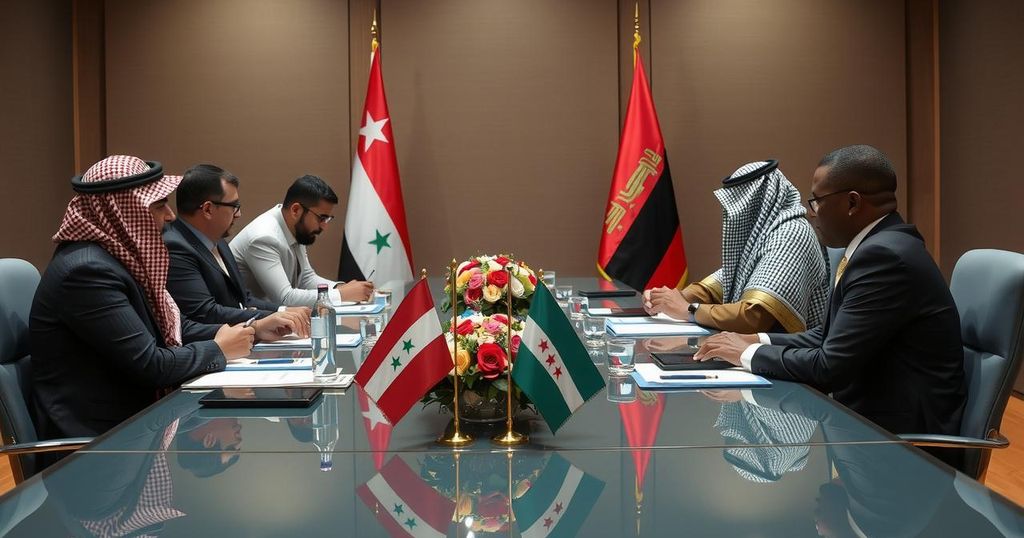Qatar Leads Arab States in Dialogue Efforts to Prevent Syrian Conflict Reescalation
Arab states, led by Qatar, are commencing conversations with all groups in Syria to prevent a re-escalation of the civil conflict following the instability of President Bashar al-Assad’s regime. Qatar emphasizes the importance of inclusive dialogue and the maintenance of state functions to foster a unified future for Syria, amid concerns of potential conflict among military factions.
Arab states are initiating open dialogues with all groups involved in the Syrian conflict to mitigate the risk of a renewed civil war. Qatar’s foreign ministry spokesperson, Majed al-Ansari, emphasized the need for inclusive discussions that encompass all Syrian factions, irrespective of their ethnic backgrounds. He expressed relief that the recent upheaval in President Bashar al-Assad’s regime did not escalate into significant violence, stating, “It makes it easier for international actors to go in and start engaging before any fighting might erupt amongst the parties on the ground.”
Al-Ansari acknowledged the importance of maintaining basic state functions such as policing and utility services during this critical transition, asserting that no group should feel marginalized or threatened in Syria’s future. He stated, “No one group, no one party or sect should feel unsafe or excluded in the future of Syria,” highlighting the necessity for proactive dialogue to prevent potential conflict among emerging military forces. Despite uncertainties over military power dynamics, al-Ansari underscored that cohesive discussions among interested parties and military factions would be essential in the weeks ahead.
Drawing parallels with previous failed uprisings in the region, he cautioned against complacency and potential setbacks, noting, “There is a tendency in the region for good news to turn into bad news.” Qatar recognizes the influential role of Turkey in the situation, given its substantial hosting of Syrian refugees and connections to various militant groups. Furthermore, al-Ansari called on Israel to refrain from actions that could escalate tensions before national dialogue commences.
The status of the prominent opposition faction, Hayat Tahrir al-Sham (HTS), remains ambiguous. While not denouncing the possibility of reform, al-Ansari expressed hope regarding HTS’s ability to act responsibly, stating, “We are encouraged by the mature way they operated in Aleppo; they allowed Kurds safe passage.”
In light of the crisis, the future of President Assad and Russian military presence in Syria will be ultimately determined by the preferences of the Syrian populace. Al-Ansari criticized the Assad regime for failing to engage in dialogues with the populace and called for a rejection of the current status quo, asserting that transitional justice should follow the establishment of a dialogue platform. Regarding Assad’s current whereabouts, al-Ansari remarked, “He is in the wind. He is no longer in the city.”
The article addresses the efforts of Arab states, particularly Qatar, to foster dialogue among various factions in Syria following the unsettling transition of power from President Bashar al-Assad. The foreign ministry’s call for inclusivity suggests a strategic approach aimed at restoring stability and preventing the resurgence of conflict. The commentary reflects upon the broader regional implications of Syria’s situation while underlining the necessity of engaging influential actors such as Turkey and addressing the role of various military factions in shaping Syria’s future.
In conclusion, Qatar’s initiative for open dialogue among Syrian factions highlights the critical need for inclusivity and communication to avert a potential resurgence of civil conflict. The proactive stance taken by Arab states, particularly in recognizing the current dynamics among military groups and the importance of maintaining state functions, is pivotal in guiding Syria towards a stable transitional period. The complexities surrounding the situation necessitate continued diplomatic engagement and collaboration among regional players to ensure a peaceful resolution.
Original Source: www.theguardian.com




Post Comment